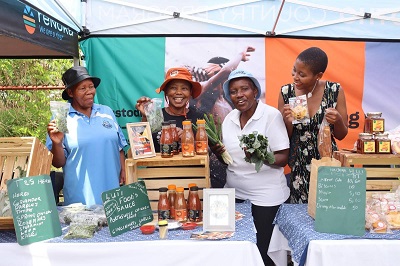By: Thandiwe Kubere
In the heart of Maseru, the Alliance Française de Maseru, in collaboration with ReNOKA (ICU) and GIZ will host the Farmers’ market on the 1st of June, where local farmers will be offered a platform to not only showcase their produce but to also take a significant step towards ensuring food security in Lesotho.
The market aims to foster direct linkages between producers and consumers, offering fresh, quality local food and handcrafted produce to Maseru’s population in the relaxed setting of Ouh la la Garden.
All categories of farmers across Lesotho, from small-scale to large-scale, are welcome to participate, adhering to the ethos that all products should be grown or processed within the nation’s borders.
Elisabeth Douillet, Director of Alliance Française de Maseru and Cultural Attachée, envisions a gradual shift towards organic and agro-ecological products, echoing the SDG’s call for sustainable agriculture practices.
As part of their vision to support local livelihoods, cultivate healthy land and water resources, and promote cultural exchange, ReNOKA and Alliance Française de Maseru have been collaborating since June 2023 to organize a monthly Farmers’ Market in Maseru.
“Rooted in conviviality, this initiative not only celebrates local farmers and their produce but also embraces the warm and communal atmosphere synonymous with French market culture”, expresses Douillet.
She enlightens, the market aims also at promoting sustainable production practices and fostering consumers’ understanding of the challenges faced by local producers, especially those in the rugged terrain of Lesotho’s mountains.
Furthermore, the market aims at contributing to the local economy and promoting a culture of quality consumption and cultural exchange.
After a first test event on the 24th of June 2023, which was successful for both producers and consumers, ReNOKA and Alliance Francaise de Maseru decided to make the market a monthly event.
The next market will be the 10th edition.
Each Farmers’ Market edition brings together approximately 50 producers who offer a diverse range of goods, from agricultural produce like vegetables and honey to processed foods, and arts and crafts.
This variety not only enriches the market experience but also serves as a testament to the rich agricultural potential of Lesotho, which is essential for achieving food security.
Douillet emphasizes the importance of the market in providing exposure for producers, allowing them to receive valuable consumer feedback and refine their marketing strategies.
The event has become a hub for networking and learning, fostering a collaborative environment where ideas to enhance sales are always welcomed. “This is an opportunity for them to network, learn, and adjust their marketing strategy”, she enlightens.
Addressing misconceptions about pricing, Douillet assures that the market is accessible to both the international and Basotho communities, with efforts underway to increase local participation. The commitment to affordability and diversity in agricultural offerings aims to dispel the notion that market produce is prohibitively expensive.
Despite logistical hurdles and the threat of inclement weather, the partnership with ReNOKA has been instrumental in the market’s success. The consistent participation and registration of producers for each edition speak volumes about their dedication and the strong relationships forged through this initiative.
Douillet states, “This shows their interest and commitment. And we are very grateful to have a strong relationship with all producers.”
The Farmers’ Market in Maseru is more than just a monthly event; it’s a vital component of a journey towards sustainable development and food security.
By aligning with the SDGs, particularly the goal of Zero Hunger, the market is not only celebrating local agriculture but also paving the way for a future where all in Lesotho have access to safe, nutritious, and sufficient food.
As the market continues to grow and evolve, it stands as a shining example of what can be achieved when community, culture, and sustainability converge.


